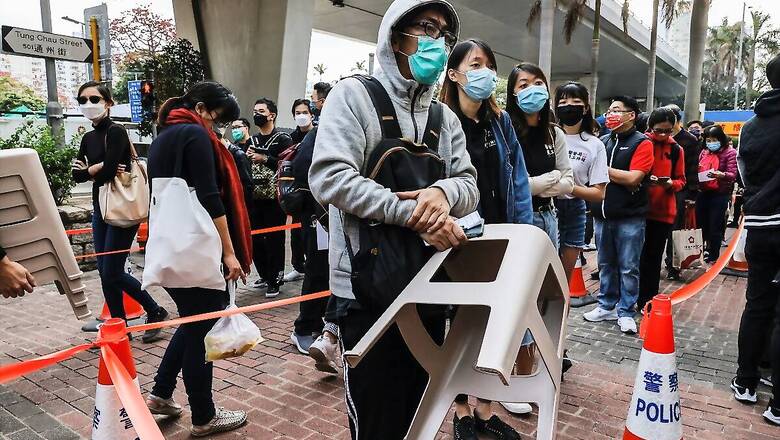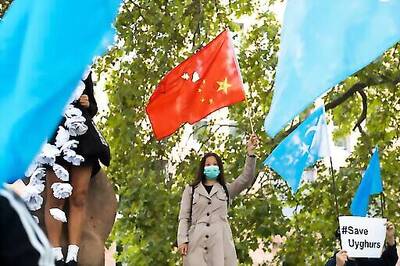
views
A Hong Kong court adjourned early on Tuesday after a democracy activist fainted during a marathon hearing of 47 people charged with conspiracy to commit subversion, as authorities intensify a crackdown on the opposition.
Following over 12 hours of submissions from defence lawyers on bail applications that ran deep into the night, democrat and district councillor Clarisse Yeung fainted in the courtroom and had to be sent to hospital by ambulance.
Her condition was not immediately known. The magistrate, Victor So, adjourned proceedings to later on Tuesday, with around half the defendants’ applications yet to be heard.
On Monday, about 1,000 people defied rules limiting group gatherings to four to curb the spread of the coronavirus, in the biggest protest this year. Protest slogans rang out throughout the day against the arrest of the 47 activists before crowds thinned out in the evening.
The activists are accused of organising and participating in an unofficial primary poll last July aimed at selecting the strongest candidates for a legislative council election that the government later postponed, citing the coronavirus.
Authorities said the informal poll was part of a plan to “overthrow” the government, further raising alarm that Hong Kong has taken a swift authoritarian turn since Beijing imposed a national security law on its freest city last June.
“This is the most ridiculous arrest in the history of Hong Kong,” said Herbert Chow, 57, who was queuing outside the court and wearing a black face mask. “But I have confidence in our judicial system to restore justice. It’s the last line of defence.”
Many were dressed in black, the colour associated with the 2019 anti-government protests, while some chanted: “Liberate Hong Kong, revolution of our times” and “Fight for freedom, stand with Hong Kong,” popular slogans during the unrest.
Others raised the three-finger salute that has become the symbol of protest against authoritarian rule in Myanmar.
The activists – 39 men and eight women, ages 23-64 – were charged on Sunday under the national security law, which punishes what China broadly defines as secession, subversion, terrorism and collusion with foreign forces with up to life in prison.
FULL FAITH
Several foreign diplomats also queued up to attend the hearing. Jonathan Williams, a diplomat at the U.K. consulate in the city, said: “It’s clear that the use of the national security law is going much broader than the Chinese and Hong Kong authorities promised.”
He added, however, that the UK government had “full faith in the independent judiciary,” to deal with the defendants fairly and impartially without political pressure.
As crowds swelled outside the court building, some held up large yellow banners that said: “Release all political prisoners now.”
Authorities have said that campaigning to win a majority in Hong Kong’s 70-seat Legislative Council, with the purpose of blocking government proposals to ramp up pressure for democratic reforms, could be seen as subversive.
Among those charged were the organiser of the primary election and former law professor Benny Tai, as well as prominent activists Lester Shum, Joshua Wong and Owen Chow.
The charges are the latest blow to the city’s pro-democracy movement. Since the security legislation was imposed on the city last June, some elected legislators have been disqualified, scores of activists arrested and others have fled overseas.
The crackdown on dissent coincides with Chinese officials preparing to unveil electoral reforms that will most likely further diminish the role and influence of opposition forces in public office.
As Beijing consolidates its hold over Hong Kong, concern is mounting in the West over freedoms promised to the former British colony when it returned to Chinese rule in 1997 and which underpin its role as a global financial centre.
U.S. Secretary of State Antony Blinken called for the 47 to be released immediately. “Political participation and freedom of expression should not be crimes,” Blinken said on Twitter. “The U.S. stands with the people of Hong Kong.” On Sunday, British Foreign Secretary Dominic Raab described the charges as “deeply disturbing.
Read all the Latest News, Breaking News and Coronavirus News here

















Comments
0 comment